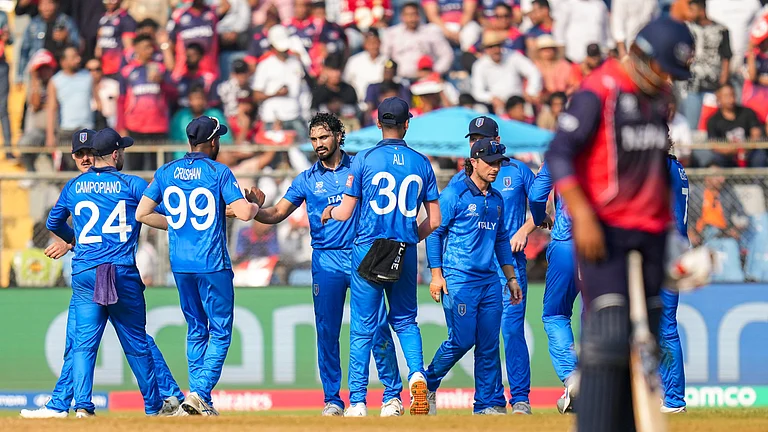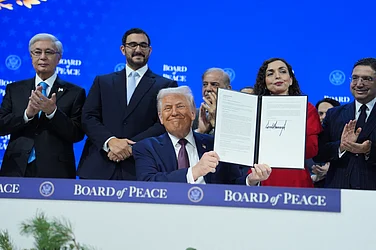The deal between Israel and Hamas for the release of hostages and a ceasefire in the Gaza Strip is "imminent", according to a report.
The deal would involve the release of hostages that Hamas took during the October 7 attack on Israel and the implementation of a ceasefire in the fighting in Gaza. The United States and Qatar have been facilitating the negotiations.
Gaza's ruling group Hamas, which has been designated by Israel, the United States, and others as a terrorist organisation, mounted an attack on Israel on October 7 in which Israeli authorities say at least 1,200 were killed, at least 5,000 were injured, and at least 240 were abducted and taken to Gaza as hostages.
The imminent deal between Israel and Hamas would be a staged process in which Hamas would release Israelis and foreign nationals taken as hostages in return of a ceasefire, reported Axios, citing sources, adding that Israel would also release Palestinian prisoners as part of the deal.
Multiple hostages have so far been confirmed as dead, including German-Israeli national Shani Louk, who was paraded in a semi-naked state by Hamas personnel in the back of a truck in Gaza City amid celebratory cheering. The footage of her being paraded was widely circulated and condemned.
What does the report say?
The report by Axios says the Israel-Hamas deal would be a two-stage process for now.
In the first process, Hamas would release around 50 hostages and Israel would release around 150 Palestinian prisoners, according to Axios, which adds that both sides would first exchange women and children. The prisoner swap would be followed by the implementation of a ceasefire.
The report further says that, following the realisation of the first stage, the humanitarian aid to Gaza would be significantly increased.
"The release of hostages and prisoners in the first phase of the deal would take place over four days of ceasefire in Gaza, one of the sources tells Axios. As part of the deal, Israel would allow around 300 aid trucks per day to enter Gaza from Egypt," said the report.
In the second stage of the deal, the report says Hamas would release another 50 elderly hostages and Israel would also release 150 Palestinian prisoners in jails. The report adds that "several more days" of the ceasefire would follow the second stage of the ceasefire.
Israel could approve deal on Tuesday: Report
Axios also reported that a senior Israeli official said that the Israeli Cabinet could convene as early as Tuesday to approve the deal.
So far, Israel has constantly rejected calls for a ceasefire and has declared the release of hostages by Hamas as a prerequisite for any ceasefire in Gaza. However, Israel has maintained temporary humanitarian pauses in the attacks on Gaza. Israel has maintained that any unconditional ceasefire would only give Hamas time to regroup and rearm against Israel.
The report comes hours after Qatar-based Hamas chief Ismail Haniyeh told Reuters that the group was "close to reaching a truce agreement" with Gaza.
Hamas is an Iran-backed group that's opposed to Israel. It has controlled Gaza since 2007. After Israel vacated Gaza in 2005, which it had occupied since 1967, Hamas won the Gaza legislative elections in 2006 and drove Fatah out of Gaza. Fatah is the mainstream Palestinian party that runs the internationally-recognised Palestinian Authority (PA) and partially runs the West Bank. The PA is the de facto Palestinian administration. Together, the West Bank and Gaza form the envisioned State of Palestine.
"The group’s ideology blends Islamism and Palestinian nationalism and seeks the destruction of Israel and the creation of an Islamic state between the Mediterranean Sea and the Jordan River...Hamas views the entirety of the land of Mandate Palestine—excluding the 80 per cent of Palestine that became modern-day Jordan—as an Islamic birthright that has been usurped. To that end, Hamas does not recognize Israel’s right to exist and has dedicated itself to violently seeking Israel’s destruction," says think tank Counter Extremism Project (CEP) about Hamas.
Following the attack by Hamas on Israel, the worst ever single-day toll on Jews since the Holocaust, Israel launched a bombing campaign in Gaza which was followed by a ground operation late last month. While Hamas leaders and facilities have been stated targets of the Israeli attacks, widespread civilian casualties have taken place in these attacks. Gazan authorities have said that over 13,000 Palestinians have been killed in Israeli attacks, most of them being women and children. Around 1.5 million Palestinians have also been internally displaced and estimates suggest up to a third of all houses have been destroyed or damaged in the attacks. As aid is nowhere close to the envisioned levels, the region is short of food, fuel, medicines, and other essentials, and is at risk of widespread disease outbreaks. The humanitarian crises in the Palestinian enclaves have led to widespread calls for a ceasefire across the world.


























